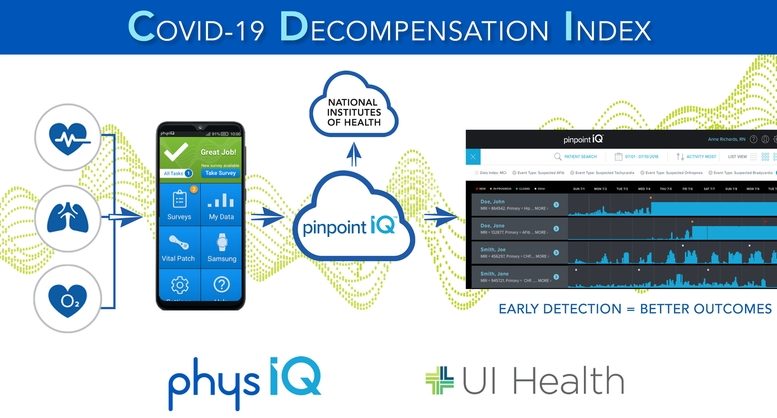The United States’ National Cancer Institute (NCI) and the National Institute of Biomedical Imaging and Bioengineering (NIBIB) of the National Institutes of Health (NIH), have awarded physIQ a contract to develop an AI-based COVID-19 Decompensation Index (CDI) Digital Biomarker to address the rapid decline of high-risk COVID-19 patients.
The new early warning system, under development, would allow providers to intervene sooner when a COVID-19 patient is clinically surveilled from home and begins to worsen. Rather than relying on point measurements, such as temperature and SpO2, that are known to be lagging or insensitive indicators of COVID-19 decompensation, continuous multi-parameter vital signs will be used to establish a targeted biomarker for COVID-19.
“Despite the technological advances and attention paid to COVID-19, the healthcare community is still monitoring patient vitals the very same way as we did in the 1800s,” said Steven Steinhubl MD, Director of Digital Medicine at Scripps Translational Science Institute (STSI) and a physIQ advisor. “With the advances in digital technology, AI and wearable biosensors, we can deliver personalized medicine remotely giving caregivers new tools to proactively address this pandemic. For that reason alone, this decision by the NIH has the potential to have a monumental impact on our healthcare system and how we manage COVID-19 patients.”
PhysIQ will develop and validate a CDI algorithm that builds off existing wearable biosensor-derived analytics generated by physIQ’s pinpointIQTM end-to-end cloud platform for continuous monitoring of physiology. The data will be gathered through a clinical study of COVID-19 positive patients in collaboration with University of Illinois Hospital and Health Sciences System (UI Health) and build upon work already in-place for monitoring COVID-19 patients convalescing at home.
For patients who participate in the program, physiological data will be collected before and after their admission to the hospital. “Since March, when the COVID-19 pandemic began, UI Health has been at the forefront of clinical research, patient care and community-based efforts to support the Chicago community. Working with physIQ is an opportunity for us to study and adapt new technology and potentially improve patient care and make a difference among the many vulnerable patients we serve, many of whom are experiencing COVID-19 disparities in their communities,” stated UI Health Chief Medical Officer, Terry Vanden Hoek MD.
In the development phase of this project, physIQ and its clinical partner will monitor participants who are confirmed COVID-19 positive, whether recovering at home or following a discharge from the hospital. During the validation phase, physIQ will evaluate lead time to event statistics, decompensation severity assessments, and the ability for CDI to predict decompensation severity. “The application of the CDI may provide a universal indicator of decompensation,” said Karen Larimer PhD, ACNP-BC, study PI and physIQ’s Director of Clinical Development. “Application of this technology could detect COVID-19 decompensation and prevent hospitalization or morbidity events in both scenarios.”
The study is designed to capture data from a large, diverse population to investigate CDI performance differences among subgroups based on sex/gender and racial/ethnic characteristics. This project will not only enable the development and validation of the CDI, it will also collect rich clinical data correlative with outcomes and symptomology related to COVID-19 infection.
“We are honoured to have been selected by the NIH to pursue such a worthy cause in such challenging times,” said Gary Conkright, CEO of physIQ. “This is a culmination of many years spent in the pursuit of developing a clinical grade product to address serious medical conditions, without taking shortcuts, that has the ability to monitor the most complicated machine in the world, the human body.”
This index will build on physIQ’s prior FDA-cleared, AI-based multivariate change index (MCI) that has amassed more than 1.5 million hours of physiologic data, supporting development of this targeted digital biomarker for COVID-19. This will enable new research and further insight into using digital health to advance the public health response.





